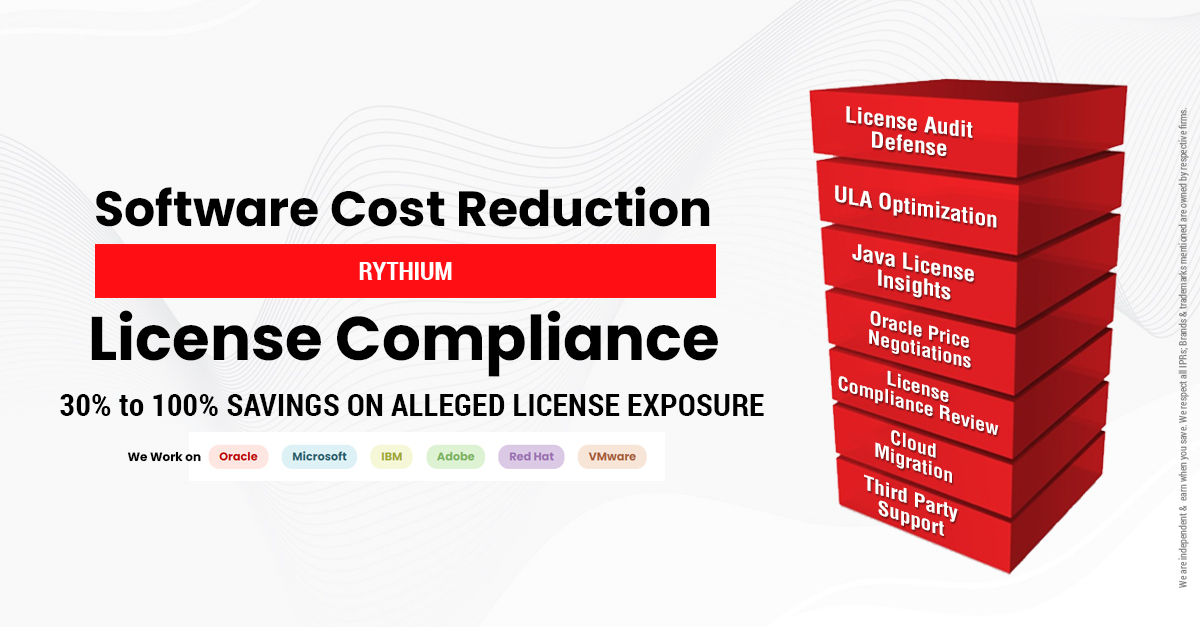Nine Mega Oracle License Cost Optimization Themes in 2025
- Java
- Oracle License Audits
- Oracle ULA Renewal Trap & ULA Certification
- Oracle BYOL to Cloud (AWS / Azure / Google)
- Oracle BYOL to Oracle Cloud Infrastructure
- Oracle E-Business Suite Migration to Cloud
- Oracle Pricing Negotiation
- Oracle Support Cost Reduction
- Third Party Support
Introduction – Why is 2025 and 2026 important for Oracle cost optimization?
2025 and 2026 are, in my view, the years during which Oracle salespeople will be the most aggressive with respect to ‘license non-compliance led deals’.
The reasons for this view are:
- While Oracle is showing growth in cloud revenues, their license revenues are falling. Oracle cannot sustain growth and investment in the cloud without fresh license deals and the corresponding support annuity.
- A large number of ULAs are coming up for renewal in 2025 and 2026. Customers are wondering if renewals are worth the expense. Every customer we speak to is considering certification of the ULA to save costs.
- Oracle has become very aggressive on Java monetization. The cost of Java has increased from zero to any number that is demanded by Oracle.
Mega Theme 1: Oracle Java Audits & Cost Reduction
For the forthcoming two or three years, Java will be one of the most useful areas for customers to consider Oracle cost optimization.
There are five options for customers with regards to usage of Java
- Stop using Java (almost an impossibility, but important to consider)
- Migrate all Java to non-commercial Java.
- Migrate Oracle Java to third-party commercial Java
- Migrate commercial Oracle Java to non-commercial Oracle Java
- Pay up the license subscription fees to Oracle for Java usage
What should customers do about Java license changes?
We believe customers should follow the process given below. These steps will help in determining which is the best option.
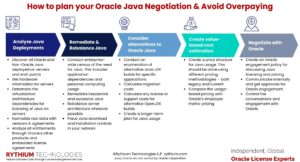
What are the challenges facing customers regarding Java license changes?
We have worked with many customers on Java, and we have had many more enquiries from potential customers during the past three years. This experience has given us deep insights into the challenges in the market regarding the understanding of Java licenses.
The findings:
-
Customers who have worked with us have been able to
- Obtained clarity on their license status.
- Many customers have realized
- They are fully licensed, OR
- The usage of commercial Java is very low compared to their entire employee or server + endpoint population.
- Make zero payment to Oracle: OR
- Delay the payments to Oracle by multiple years. (This is because of the clarity they have on being fully licensed & Oracle’s reluctance to immediately accept the status)
- Negotiate a much lower price compared to the Oracle price ask.
- Remediated non-compliant Java installations to ensure better license compliance, security and performance.
-
Customers who have not engaged us after initial discussions on hiring us:
- Paid Oracle much higher fees than what we believed to be correct value.
- Signed contracts without understanding the future exposure.
Mega Theme 2: Oracle License Audits
Outlook for Oracle software license audits in 2025 & 2026
Oracle’s License Audits (including threats of audits) have been the go-to channel for increased license revenue by Oracle during the past two decades. There is no reason to believe that this will change in the next two years.
Instead, it is expected to increase given that Oracle’s license revenue continues to see negative growth.
How to recognize an Oracle Audit?
Oracle audits can be formal, informal, or even casual. But they are not random. Below are some descriptions of Oracle license audits & their stages.
- A seemingly friendly ask by Oracle salesperson on your architecture or deployment or to advise you on your Oracle footprint.
- An email or letter from Oracle’s LMS team to educate you on Oracle licensing.
- A formal notice for audit from Oracle LMS or Oracle’s legal counsel.
What is the Oracle Software License Audit Process?
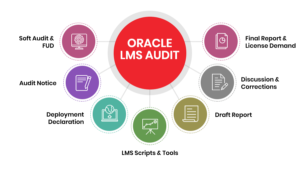
What is the Oracle Audit Process?
A formal Oracle LMS Audit goes through the following stages:
- Formal Notice
A formal notice for an audit or a correspondence discussing the measurement of your deployment. This formal letter / email / legal notice kicks off the timelines that Oracle wants to follow for the start and completion of the license audit process. - Kick-Off Meeting
Oracle will call for an initial meeting to explain the details of the data needed to perform the audit and Oracle license consumption analysis. - Sharing of data through the Oracle Server Worksheet
A declaration of usage by the customer through the update of an MS Excel spreadsheet. - Discovery through scripts and tools
Oracle will ask you to run scripts on al the servers and upload the data to their license audit portal. Sometimes network query tools might also be deployed. These tools gather Oracle products and hardware installation data. - Oracle Audit Report
Oracle will analyze the script outputs and provide the initial draft report. During the analysis period Oracle might ask additional questions for clarity on usage. Analysis of the gathered usage data.
The draft report will have a reconciliation of your entitlements and consumption. The report will identify the license compliance gaps. - Settlement
In case of non-compliance, the Oracle LMS team conducting the audit will internally collaborate with the Oracle sales team and submit a commercial proposal that will correct the license gap. This proposal will generally include significant penalties for past usage of Oracle products.
Key Points to remember about rights and obligations in an Oracle license audit
There are two points to be noted when you receive an Oracle license audit notice:
- You need to respond. Not responding to an audit notice from Oracle can have legal repercussions.
- You have rights. Do not lose sight of your rights. You can save immensely (maybe even 100% of potential non-compliance) if you understand how to use your rights.
So, what should customers do in the face of an Oracle license audit?
- Respond
- Get visibility of your deployments
- Remediate and rebalance within the licensing policies
- Be ready for the audit
Why do customers fail in an Oracle software license audit?
An Oracle license audit can become a very expensive affair for customers. The general reasons for this are:
- Not understanding Oracle licensing policies. While it seems cliched to say ‘not understanding Oracle licensing policies’, this is actually the main reason for customers ending up paying millions of dollars in penalties and license fees to Oracle.
The actual challenge is worse… Customers believe they understand Oracle’s licensing policies. Unfortunately, it is not very true. At a very high-level Oracle’s licensing is easy to understand, but the intricacies of usage and application of micro licensing fine print can make it very hazardous for customers.
- The seemingly easier issues that customers need to look at are:
- Unlicensed features in databases (options and packs)
- Unlicensed databases
- Confusion about how Processor metric needs to be calculated in Oracle licensing
- Incorrect counting of minimums or the total number of Named User Plus (NUP) licenses
- Use of virtualization
- Use of licenses on the cloud
- Not counting of licenses on DR, Test, Development servers
- We have also found challenges in companies that have employed junior level software asset managers too. Most SAM professionals understand basic licensing. Expertise in licensing of any publisher requires decades of experience.
Mega Theme 3: Oracle ULA Renewal Trap & ULA Certification
Popularity of the ULA
The Oracle Unlimited License Agreement (Oracle ULA / ULA) is the most popular license purchase agreement across all the territories Oracle operates in. Almost all banks, insurance companies, large & small IT companies, large and medium sized manufacturing companies, large & medium sized transport, logistics & retail companies, and large & medium sized healthcare companies around the world have signed Oracle ULAs.
Who benefits from the Oracle ULA – the customer or Oracle?
Rule of thumb on this question:
- First time ULA: The customer benefits (to an extent)
- ULA Renewals: Oracle benefits (almost always)
While the above is true in almost all situations, each case is a bit different. It is important to look at the specifics of each customer’s IT architecture, future plans and market dynamics.
What is the Oracle ULA Renewal Trap?
Let me give you an example of a customer of ours who has been constantly renewing their Oracle ULA four times since 12 years. Now, in the 15th year they have finally certified it after our advice.
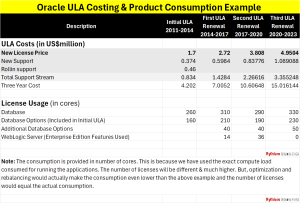
Value from the ULA
As you can see from the table above:
Total Expenditure on Oracle ULA: US$ 36m
Increase in Consumption: Almost zero
What is the current status?
The customer has certified the ULA in 2023 and has modified the deployment architecture to ensure that they do not need any additional license of the products in the ULA bill of materials for the foreseeable future.
What is the recommendation for Oracle ULA Certification or ULA Renewal?
- Personnel from procurement, finance and IT should commence a three-phase project many months prior to the expiration of the ULA. This initiative should aim to assess and identify the most effective options for optimizing value, mitigating risk, and reducing costs.
- While there is no rule that all ULAs should be certified, the pros and cons of both ULA certification and ULA should be studied objectively. The IT team should be open to new ideas of database deployment architectures so that software assets like Oracle database licenses can be used optimally.
- Pricing is an important aspect in ULA renewals. It is quite unfortunate that customers pay very high prices for little additional value.
Mega Theme 4: Oracle BYOL to Cloud (third party AWS / Azure / Google clouds)
Oracle Software Licensing Policy on Third Party Cloud
First we should understand the basics of Oracle’s licensing policy for their key products (Database and WebLogic) on the cloud:
Approved Cloud Providers
- The Approved Cloud Providers are also known as ‘Approved Vendors or ‘Authorized Cloud Environments’ in Oracle’s documentation.
- Oracle’s policy for licensing their technology software on public cloud platforms applies to environments provided by the following Approved vendors:
- Amazon Web Services (AWS): Amazon Elastic Compute Cloud (EC2) and Amazon Relational Database Service (RDS)
- Microsoft Azure
- Google Cloud Platform (GCP)
Guidelines for Oracle Software Licensing in Cloud Environments
When licensing Oracle software in an approved cloud environment, the following guidelines apply:
Processor Licensing in Cloud:
- Virtual Processor (vCPU) Equivalence:
- Two vCPUs are equivalent to one Oracle Processor license if multi-threading is enabled.
- One vCPU is equivalent to one Oracle Processor license if multi-threading is not enabled.
- Oracle Processor Core Factor Table: The Oracle Processor Core Factor Table does not apply in cloud environments.
- Example: To license Oracle Database Enterprise Edition on a single instance with four vCPUs and multi-threading enabled, two Oracle Processor licenses would be required.
Standard Edition Licensing in Cloud:
- Instance Size:
- Instances with four or fewer vCPUs are counted as one socket (equivalent to one Oracle Processor license).
- Instances with more than four vCPUs are rounded up to the nearest multiple of four and counted accordingly.
- Maximum Instance Size:
- Oracle Database Standard Edition: 16 vCPUs
- Oracle Standard Edition One and Standard Edition 2: 8 vCPUs
- Named User Plus (NUP) Licensing:
- A minimum of 10 NUP licenses is required for every 8 vCPUs when licensing Database Standard Edition 2 by NUP.
Unlimited License Agreements (ULAs):
Licenses acquired under ULAs can be used in approved cloud environments but cannot be included in the certification process at the end of the ULA term.
Core Factor Table Not Applicable
When counting Oracle Processor license requirements in Authorized Cloud Environments, the Oracle Processor Core Factor Table is not applicable.
What should customers do?
The usage of Oracle BYOL licenses on the cloud is, according to me, the best way to save money on Database & WebLogic. The reasons are
- Oracle’s ‘Hard Partitioning’ rules apply.
- The licenses counted are only for the compute load that is being actually used.
Customers should:
- Reuse existing on-premise licenses as BYOL onto third-party approved clouds environments.
- Right-size the cloud instances. This will help customers consume less licenses and save money.
How should Oracle ULA customers use BYOL onto AWS / Azure / Google cloud?
The key issues to remember are:
- During ULA term, customers can use the licenses on any cloud environment.
- At the end of ULA term, customers cannot certify the usage on the cloud.
So, customers should:
- Plan the timing and quantum of usage.
- Do not use licenses on the cloud during the ULA term unless the certification priorities are planned prior to cloud deployment.
- Be strategic in the use of Oracle BYOL licenses after getting the certified grant of perpetual licenses at the end of the ULA term.
Potential Savings for Oracle ULA customers
We have clients who have not procured a single new license of Oracle Database or WebLogic after migrating BYOL licenses to the cloud. In fact they end up with an excess number of licenses.
Mega Theme 5: Oracle BYOL to Oracle Cloud Infrastructure (OCI)
Oracle touts this as the best ‘investment protection’ scheme with regards to the usage of perpetual license while migrating to the cloud.
Key Points in understanding Oracle BYOL to OCI
- BYOL is available for both IaaS and PaaS
- OCPU is the license metric used to measure consumption in OCI.
- One OCPU is equal to one Intel core
- Conversion Ratio is
- Processor License: One Oracle Processor License maps to two OCPUs.
- 25 NUP per Processor
- While migrating to OCI, 100 days of usage on-premise is allowed.
- BYOL to PaaS allows usage of Diagnostic Pack & Tuning Pack without its equivalent on-premise license.
Where can you find information about Oracle BYOL to OCI?
- The detailed rules are in the document titled Oracle PaaS and IaaS Universal Credits Service Descriptions. It is available here
- There is a simplified understanding in this FAQ here
What is good for customers?
- BYOL is useful for customers who have a large number of perpetual licenses.
- BYOL is useful for customers who want to continue with Oracle support.
- BYOL on Third Party Clouds can be used even without support. This will be useful for customers who might be looking to migrate other databases.
Mega Theme 6: Migrating from E-Business Suite to Oracle Cloud ERP or any other non-Oracle SaaS ERP
What are the options for migration of E-Business Suite to the Cloud?
- Lift & Shift EBS to OCI
- Lift & Shift EBS to Third Party cloud
- Migrate to Oracle Cloud Applications
- Migrate to a non-Oracle ERP
License Implications of the different options for EBS Migration
- Lift & Shift EBS to OCI
- The customer can use all the perpetual EBS licenses on OCI.
- The customer can use the Oracle Database & WebLogic perpetual licenses as BYOL in OCI
- If the customer moves to PaaS on OCI, Diagnostic Pack & Tuning Pack can be used on the database without having a corresponding on-premise license.
- Lift & Shift to Third-Party Cloud
- Customer can use the perpetual EBS licenses on the third-party cloud.
- If the customer has used any of the Approved Cloud vendors (AWS, Azure, Google), then the customer can use BYOL license of the database & WebLogic
- Migrate to Oracle Cloud Applications
- It is a strictly new implementation.
- Oracle has tools to help in the migration process.
- There are no savings for holding the old perpetual licenses. Discounts provided for purchasing the new Oracle Cloud Applications SaaS license are only notional.
- Migrate to a non-Oracle ERP
- It is strictly a new implementation.
- The new vendor might provide a large discount because of migration to their platform instead of continuing on Oracle.
License Audit Situations when you migrate EBS to Cloud
Oracle uses license audits strategically:
- To increase revenue
- To upsell new products
Customers should expect audit situations to arise in case they have begun discussions on shifting their Oracle to the cloud.
Mega Theme 7: Oracle Support Fees Reduction
- Oracle support fees have consistently increased, creating a financial challenge for numerous organizations. The annual hikes are now at 8% a year. This means your support costs will increase by 50% within 5 years of purchasing the license from Oracle.
- While it is speculated that the 8% increase is a way of pushing customers to use OCI (the Oracle Cloud Infrastructure), it actually meets another goal, that of increasing the license revenue. This is because 68% of all support revenue is allocated to software update license revenue.
- Oracle does not easily reduce their support fees for customers.
Thus, Oracle support and the increase in value each year remains a bugbear for all Oracle customers.
What should customers do?
First question is: Can support be reduced?
The answer is: YES
But, unfortunately, the road to reducing support is not easy. Nor is it a cookie-cutter kind of standardized approach for every customer of Oracle.
We help strategize the support reduction efforts and execute it for our clients.
Mega Theme 8: Third Party Support for Oracle Products
This theme could have been included in the earlier one titled “Oracle Support Fees Reduction”, but I decided not to. The reason being that, while third party support does indeed help in reducing support costs, there are many factors that need to be looked into before moving out of Oracle support.
What should customers do before considering Third Party Support?
- Understand the current value of support that you are paying for. This includes the number of times Service Requests are raised, the severity level of the requests, the reasons for accessing Oracle’s support services.
- Benchmark the total quantum of support fees to local and global discounts
- Assess legacy contracts for cancellations. This is tricky but doable.
- Assess the internal capabilities of your IT team to deal with support challenges.
The above review will place you in a better position to evaluate third-party support versus Oracle support independently and compare the two on multiple parameters.
Third-party support is financially very attractive as the diagram below shows. But it is not a decision that can be taken in isolation or only on a single ‘cost’ factor.
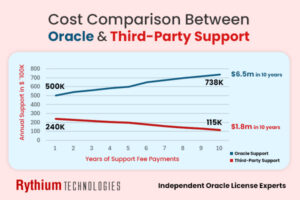
Mega Theme 9: Oracle Procurement Negotiations
This is one of my all-time favorite themes with regards to reducing Oracle costs.
During any negotiation, Oracle desires to
- Have the upper hand
- Force / Aggressively persuade customers to pay the proposed price
- Give notional discounts
What are our goals in an Oracle negotiation?
- Gain control of the conversation and negotiation process
- Not be pressurized on value and timing of the deal
- Get the best prices and commercial terms benchmarked to the highest discounts, most flexible consumption rights and the least constraining obligations.
You can benefit between 30% to 100% reduction
in Oracle costs if you engage us.
Read more about our services
- ULA Management & Certification: https://rythium.com/oracle-ula-certification-exit/
- Java License Review: https://rythium.com/java-license-review/
- Oracle License Audit Defense: https://rythium.com/oracle-license-audit-defense/
- Oracle Pricing & Procurement Negotiations: https://rythium.com/oracle-pricing-negotiation/

